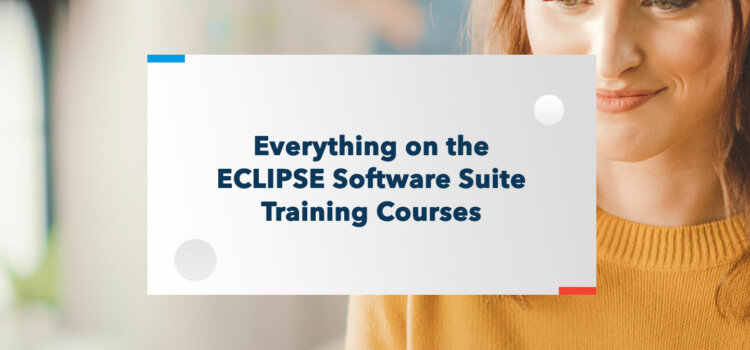
ECLIPSE Training: Overview and benefits explained
08 Jul, 2025
Whether you choose standard training or tailored training, ECLIPSE training courses are carefully designed to build your expertise and knowledge about ECLIPSE. These courses offer structured learning paths that are customized for a variety of roles and project needs. By participating, you can expect to master time-saving functions, strengthen team collaboration, and adopt best practices for managing project content and reporting. This article focuses on the training options, processes, and benefits.
For whom is ECLIPSE Training?
ECLIPSE training is suitable for a wide range of users and organizations that rely on the ECLIPSE Software Suite for project management, content control, and collaboration. These courses are designed to meet the needs of:
- New users who require a comprehensive introduction to the software and its modules.
- Returning users who have worked with ECLIPSE in the past and want an update to refresh their knowledge.
- Experienced users aiming to deepen their proficiency and explore advanced features.
- Project managers and coordinators who need to oversee workflows, reporting, and team collaboration.
- Administrators and IT professionals responsible for configuring, maintaining, and supporting ECLIPSE environments.
- Teams implementing new modules or expanding ECLIPSE’s role within their organization.
What is the typical process of the training?
The ECLIPSE training process follows a clear and logical sequence:
1. Getting started
- Submit your request for training, outlining your team’s objectives and specific needs.
- Our training staff conducts an intake session to clarify your requirements and ensure alignment with your project goals.
2. Customization and preparation
- If you have specialized needs, the program is tailored to your requirements.
- All course materials are prepared, including slides, demonstrations, and practical exercises.
3. Course delivery
- Training opens with an introduction to set expectations and learning objectives.
- Each section uses a repeating format: slides to provide foundational knowledge, demonstrations to illustrate application within ECLIPSE, and hands-on exercises for practical experience.
- During the training, participants are welcome to ask questions.
- Practice and reviews ensure comfort with the material before moving forward.
4. Aftercare and certification
- Upon completion, participants receive ongoing support, answers to follow-up questions, and additional resources.
- A certificate of attendance is provided, with the option to complete a knowledge test to become a Certified ECLIPSE User.
For teams with unique requirements, tailored training is available.
Which options does ECLIPSE offer to tailor the training?
Next to the standard ECLIPSE training, ECLIPSE delivers a broad set of tailored training options to fit any organization. For example, we can tailor our training in the following ways:
- Specialized: In-depth focus on specific modules or advanced features. Perfect for users who need expert-level knowledge in targeted areas.
- Efficiency: Combines the basics of multiple modules into one course, saving time by highlighting common features. Great for teams who want quick, broad coverage.
- Expand: Adds process best practices or industry standards to the training. Suitable for organizations aiming to integrate ECLIPSE with their workflows.
- Compact: Focuses only on the most important functions for a specific audience. Best for those needing essential knowledge in less time.
- Questions & Answers: Audience-driven sessions shaped by participants’ questions and needs. Ideal for addressing unique scenarios or clarifying advanced topics.
You can choose from the training types before you contact us, or we can help you choose the one that fits best for your team.
What can you gain from an ECLIPSE training?
ECLIPSE training equips users with essential skills and deepens their ability to maximize the software’s capabilities. Key benefits include:
- Learning time-saving functions for bulk operations, improving daily efficiency
- Improving content retrieval and reporting, supporting accurate, data-driven decision making
- Gaining methods for formalizing follow-up actions and maintaining clear project records
- Enhancing team collaboration through better content sharing and communication
- Managing event lifecycles for greater control over project outcomes
- Understanding audit trails to ensure transparency and accountability
- Strengthening data protection with effective user access controls
- Customizing project workflows to support organizational needs
- Developing strategies to organize and manage project content
- Techniques for cleaning up projects and removing unnecessary data
- Setting up and managing data exchange within ECLIPSE for seamless integration
Can I choose between in-person, virtual classroom, and offline learning?
Our ECLIPSE training methods can be adapted to the requirements of every team. You can select traditional classroom sessions at a dedicated location or join a virtual classroom from anywhere. Next to this, we offer offline training so you can learn independently and outside of set schedules. All ECLIPSE training methods have their own set of benefits.
Enhance your ECLIPSE skills today
Investing in ECLIPSE training equips you with the knowledge and skills to maximize the software’s benefits, leading to more efficient project management and collaboration. Whether you choose a fixed curriculum, tailored training, or participate in workshops, these educational opportunities are designed to support your success. Contact us to enroll in an ECLIPSE training course.

Desmond Gardeslen
Product Marketing Manager
Passionate about the intersection of space technology, marketing, business, engineering, and innovation.


